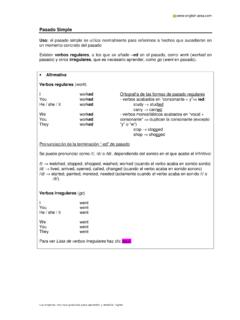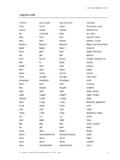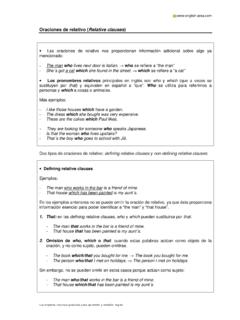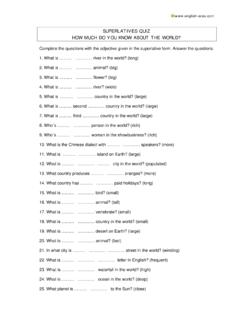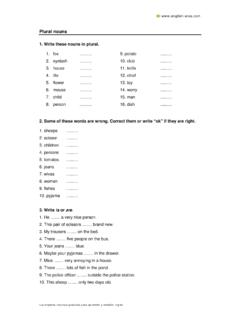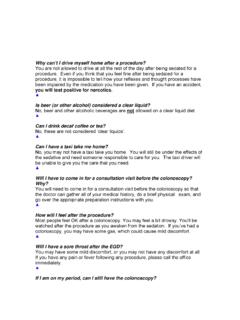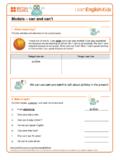Transcription of Can could y be able to - english-area.com
1 Los mejores recursos gratuitos para aprender y ense ar ingl s Can, could y be able to Can expresa la capacidad para hacer algo, una posibilidad, y tambi n se usa para pedir permiso. Pero no se utiliza para expresar probabilidad. (Ver May y might) Afirmativa Negaci n forma completa forma contra da I can cook I cannot cook I can t cook You can cook you cannot cook you can t cook He/she/it can cook he/she/it cannot cook he/she/it can t cook We can cook we cannot cook we can t cook You can cook you cannot cook you can t cook They can cook they cannot cook they can t cook Interrogaci n respuesta breve + respuesta breve - Can I cook? Yes, I can No, I can t Can you cook? Yes, you can No, you can t Can he / she / it cook? Yes, he / she / it can No, he / she / it can t Can we cook? Yes, we can No, we can t Can you cook?
2 Yes, you can No, you can t Can they cook? Yes, they can No, they can t could es la forma de pasado de can. Afirmativa Negaci n forma completa forma contra da I could cook I could not cook I couldn t cook You could cook you could not cook you couldn t cook He/she/it could cook he/she/it could not cook he/she/it couldn t cook We could cook we could not cook we couldn t cook You could cook you could not cook you couldn t cook They could cook they could not cook they couldn t cook Interrogaci n respuesta breve + respuesta breve - could I cook? Yes, I could No, I couldn t could you cook? Yes, you could No, you couldn t could he / she / it cook? Yes, he / she / it could No, he / she / it couldn t could we cook? Yes, we could No, we couldn t could you cook? Yes, you could No, you couldn t could they cook?
3 Yes, they could No, they couldn t Los mejores recursos gratuitos para aprender y ense ar ingl s Ejemplos: - When I was young I could run very fast, but now I can t - I could walk when I was ten months old. - Paul can t cook. His meals are terrible. - I can drive, but Sarah can t. Be able to tiene un significado similar a can/ could , pero suele utilizarse para expresar la habilidad de hacer algo de cierta dificultad (en espa ol equivale a ser capaz de ): I can walk very fast They were able to escape from the fire. She could draw very well at 10. When she was five, she was able to draw wonderful pictures. - Tambi n se utiliza en lugar de can en el futuro, ya que can no tiene una forma para ese tiempo: I can/ could find that street I ll be able to find that street. - Otros casos en los que se utiliza be able to, y no can, es cuando tiene que ir seguido de un infinitivo con to o una forma en ing, ya que can/ could s lo puede ir seguido de un infinitivo sin to.
4 We were very happy to be able to be there (no We were very happy to can to be there*) I have to be able to run the marathon (no I have to *) Sujeto + verbo to be (en cualquier tiempo) + to + infinitivo
